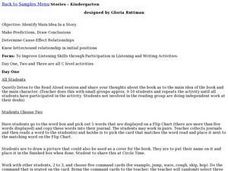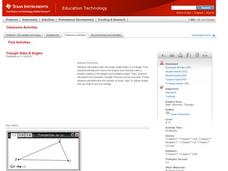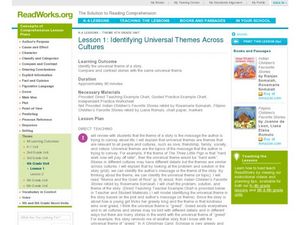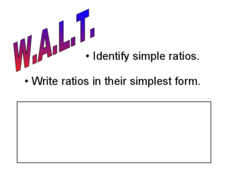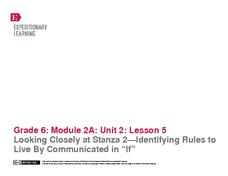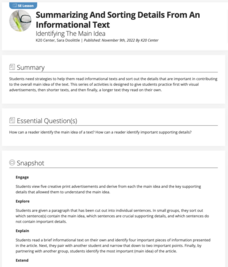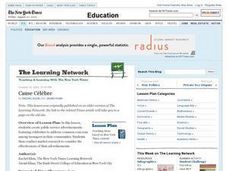Curated OER
Identify Main Idea in a Story
Help your kindergarteners identify the main idea in a story. Small groups work with the teacher to make predictions and draw conclusions. They are able to determine cause and effect relationships. The instructional activity is divided...
Texas Instruments
Identifying a Triangle by its Sides and Angles
Identify triangles by their angle measures and side lengths by looking at and measuring angle measures and side lengths. Use Cabri Jr. to construct various triangles, then manipulate the construction to create the 6 types of triangles,...
Curated OER
Identify Numbers of Fall Objects
In this identifying numbers of fall objects worksheet, students read a number in each box and circle the correct number of fall pictures. Students circle four groups of fall objects.
Scholastic
Identifying a Target Audience
How do advertisers try to speak to you? Learners review a variety of advertisements and identify how they attempt to reach a particular targeted audience, as well as consider what type of audiences they might belong to as young...
Curated OER
Identifying Setting Using Evidence from the Text
Help young readers find the setting in the story. They will review what a setting is with a modeled example by the teacher. After reading The Cow Who Wouldn't Come Down by Paul Brett Johnson and completing a practice sheet,...
Curated OER
Identifying Universal Themes Across Cultures
Have your class read the story "The Magic Lake," retold by Liana Romulo, from Filipino Children's Favorite Stories. Guide them to identify the problem, solution, and universal theme. They compare the theme of this story to the theme of...
Primary Resources
Identifying Ratios
Kids complete three different activities to better understand how to identify ratios and then write them in simplest form. Ratios are represented by fraction strips of two different colors. Pupils write what ratio of blue to red is...
K12 Reader
Identifying Geometric Solids
After reading a short passage that identifies different types of geometric solids, kids answer a series of questions using information found in the article.
Curated OER
Identifying Patterns
Find the pattern! Eighteen number sequences challenge scholars to identify and complete the pattern, adding at least four digits to the given numbers. All the sequences here involve skip counting by various single-digit numbers,...
Scholastic
Study Jams! Identify Outcomes and Make Predictions
Making predictions and identifying possible outcomes are skills that all science pupils should possess. In this video, Mia and Sam discuss the chances of puppies being male or female as an example. The animation is adorable, and will...
EngageNY
Looking Closely at Stanza 1—Identifying Rules to Live By Communicated in “If”
Here is a lesson plan in which pupils connect themes and rules to live by from the story Bud, Not Buddy by Christopher Paul Curtis to those found in the poem If by Rudyard Kipling. First, scholars discuss their reading and review Bud's...
EngageNY
Looking Closely at Stanza 2—Identifying Rules to Live By Communicated in “If”
Pupils take part in a close reading of the poem, If by Rudyard Kipling, in which they delve deep into its meaning and identify its rules to live by. As the grand discussion progresses, learners then relate the poem's rules with those...
EngageNY
Launching A Midsummer Night’s Dream: Identifying the Characters, Settings, and Conflicts
Scholars form a drama circle and begin reading Shakespeare's A Midsummer Night's Dream. They also use a play map to identify the setting, characters, and conflicts from the text.
American Chemical Society
Mixing Liquids to Identify an Unknown Liquid
Yellow and blue make green in a colorful lesson on liquid solutions. The seventh installment of a 16-part Inquiry to Action series asks pupils to mix different-colored solutions and record their observations. They then use their...
EngageNY
Identifying Author’s Opinion and Evidence: The Value of Sports in People’s Lives, Part II
Context matters! Using the intuitive resource, pupils decipher context clues to determine the meaning of unknown words from an informational text. Also, in small groups, they practice identifying the author's opinion and supporting...
EngageNY
Mid-Unit Assessment: Identifying Author’s Opinion, Reasons, and Supporting Evidence: “Courage on the Field”
What do you think? Scholars complete a mid-unit assessment in which they identify an opinion in Courage on the Field along with evidence that supports it. After the assessment, pupils complete Tracking My Progress, Mid-Unit 2...
EngageNY
Identifying Supporting Reasons and Evidence for an Opinion: Exploring Jackie Robinson’s Promise (Promises to Keep, Pages 38–45)
Readers take a look at pages 40-45 in Promises to Keep and identify evidence to support Sharon Robinson's opinion about her father. They divide up the text and complete task cards before writing vocabulary from the story on index cards.
K20 LEARN
Summarizing and Sorting Details from an Informational Text: Identifying the Main Idea
Scholars participate in two activities that teach them to identify the main idea and key supporting details in informational text. Partners create a visual that reflects the main idea and key supporting details in an informational text...
Curated OER
Identifying the Theme in a Story
Middle schoolers recognize Theme through the use of simple, short stories. Using Pro Quest, students begin by researching the literary element, theme, and how it can be identified. They then identify the themes in Aesop's...
Curated OER
Identify the Mood
In this reading worksheet, students identify the mood of a book, story, song, movie, TV show, or play. Students record words and phrases about the characters, setting, and plot. Students also describe their resulting feelings and thoughts.
Curated OER
Identify People
In this identifying people instructional activity, students observe a group of pictures and determine which picture does not include people and does not belong. Students circle one picture.
Curated OER
Identifying the Problem in a Story
Model how to identify and describe the problem in a story with Eve Bunting’s My Red Balloon. Then guide your learners through the process with Olivia and the Missing Toy. For independent practice, individuals draw a picture and write a...
Curated OER
Identify Geometric Shapes
Practice identifying quadrilaterals, triangles, and closed curves with this worksheet. Given a series of shapes, learners check boxes next to each shape to indicate whether it under the correct label. Possible shape types are...
Curated OER
Cause Célèbre
In this exercise, learners identify characters from an "Archie" comic and discuss the relevance of "Archie" to today's youth. They create public service advertisements featuring celebrities to address common concerns among teenagers in...
Other popular searches
- Identifying Context Clues
- Identifying the Main Idea
- Identifying Main Ideas
- Identifying Parts of Speech
- Identifying Nouns
- Identifying Point of View
- Identifying Topic Sentences
- Identifying Mood
- Identifying Parts of Plants
- Identifying Author's Purpose
- Identifying Authors Purpose
- Identifying Emotions


